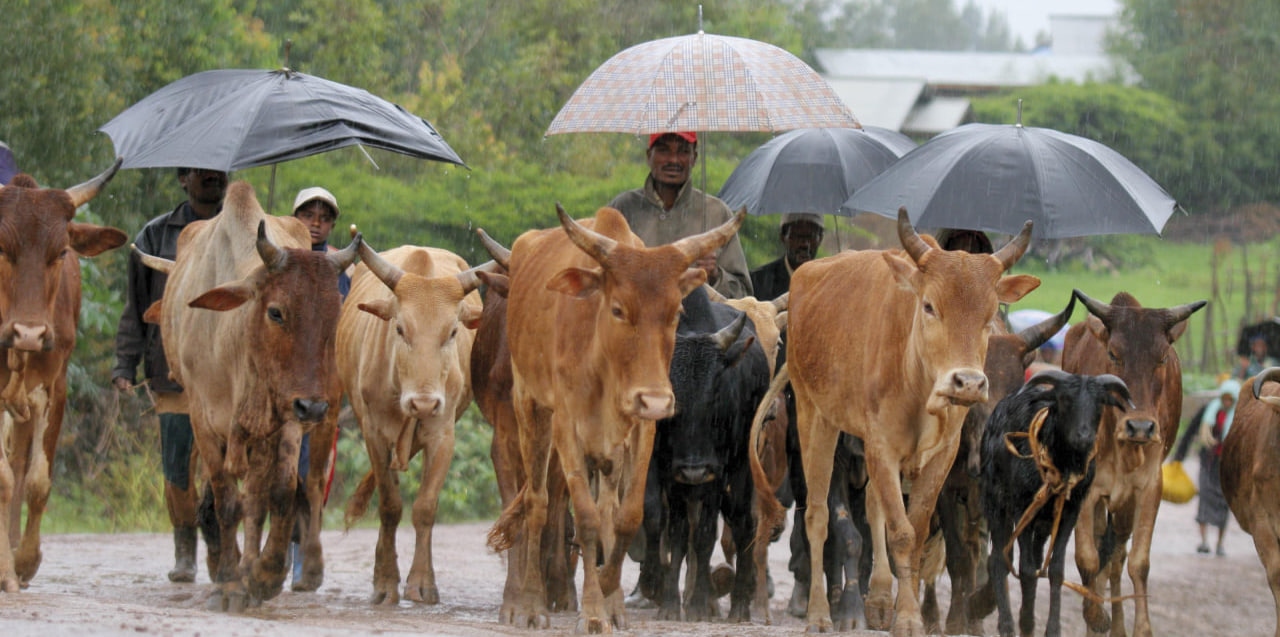
Copyright infringement not intended
Context: The Union Minister of Fisheries, Animal Husbandry & Dairying inaugurated NANDI (NOC Approval for New Drug and Inoculation System) portal at Krishi Bhawan, New Delhi. The portal was developed by the Department of Animal Husbandry and Dairying (DAHD).

Details
- The NANDI portal aims to facilitate the process of granting No Objection Certificates (NOC) for veterinary drugs and vaccines in India.
Background
- The livestock sector is one of the fastest-growing sectors in India, contributing to about 4.35% of the GDP and 29.35% of the agricultural GDP.
- The livestock sector provides livelihoods to millions of farmers and rural households, as well as food security and nutrition to the population. However, the sector faces various challenges such as low productivity, high mortality, disease outbreaks, environmental degradation and lack of quality inputs.
- To address these challenges, there is a need for effective regulation and approval of animal drugs and vaccines that are safe, efficacious and quality assured.
The current process of granting NOC for veterinary products
- The current process of granting NOC for veterinary products involves multiple steps and stakeholders, such as the DAHD, the Central Drugs Standard Control Organization (CDSCO), the Expert Committee on Animal Health (ECAH), the sub-committees on vaccines and drugs, and the applicants.
- The process is time-consuming, cumbersome and prone to errors and delays. Moreover, there is no online platform for tracking the status of applications and communicating with the concerned authorities.
To overcome these limitations, the DAHD has developed the NANDI portal through CDAC in coordination with CDSCO in pursuance of the spirit of Digital India's vision.
NANDI portal has the following features:
- It allows online submission of applications for NOC for veterinary drugs and vaccines by manufacturers or importers.
- It enables end-to-end coordination between departments, committees, sub-committees and applicants, ensuring smooth and efficient operations.
- It provides real-time updates on the status of applications and facilitates timely feedback and queries.
- It integrates with the SUGAM portal of CDSCO, further simplifying the approval process for veterinary products.
- It maintains a database of approved veterinary products along with their details such as name, composition, dosage, indications, contraindications, adverse reactions etc.
- It generates reports and analytics on various parameters such as the number of applications received, processed, approved or rejected etc.
|
SUGAM portal
● The SUGAM portal of CDSCO is an online platform that enables applicants to submit applications for various regulatory approvals related to drugs, cosmetics, medical devices and vaccines in India.
● It aims to streamline the process of application submission, review, approval and monitoring by providing single-window access to all stakeholders.
● It provides information on the regulatory requirements, guidelines, fees and timelines for different types of applications.
|
Significances
- It reduces the time and cost involved in obtaining NOC for veterinary products, thereby enhancing their availability and accessibility for farmers and veterinarians.
- It ensures transparency and accountability in the approval process, thereby improving the trust and confidence of stakeholders.
- It promotes innovation and research in the field of animal health by encouraging new product development and import.
- It improves the quality and safety of veterinary products by ensuring compliance with national and international standards and guidelines.
- It supports animal welfare and public health by preventing and controlling animal diseases and zoonoses.
Challenges that need to be addressed for its effective implementation
- The portal requires adequate infrastructure such as internet connectivity, hardware and software support etc. to function smoothly and reliably.
- The portal needs regular updation and maintenance to ensure its security and functionality.
- The portal requires proper training and awareness among users such as manufacturers, importers, regulators etc. to ensure its optimal utilization.
- The portal needs to be harmonized with other relevant portals such as e-Gopala, e-Surveillance etc. to ensure data integration and interoperability.
- The portal needs to be monitored and evaluated periodically to assess its impact and performance.
The NANDI portal is a welcome initiative that has the potential to transform the livestock sector in India by facilitating the approval process for veterinary products. However, it also requires concerted efforts from all stakeholders such as government agencies, industry associations, research institutions etc. to ensure its successful implementation.
Some of the possible steps that can be taken are:
- Strengthening the infrastructure and technical support for the portal.
- Conduct regular training sessions and workshops for users.
- Creating awareness campaigns and outreach programs for stakeholders.
- Developing feedback mechanisms and grievance redressal systems for users.
- Establishing linkages with other relevant portals.
- Reviewing and revising the policies and guidelines for veterinary products.

Conclusion
- The NANDI portal is a landmark initiative that aims to expedite the regulatory process for the approval of animal drugs and vaccines in India. It has several features and significance that can benefit the livestock industry and the economy. However, it also faces some challenges that need to be overcome for its effective implementation. The portal is expected to be a game-changer for the animal health sector and a boon for farmers and rural households.
Must Read Articles:
Livestock census: https://www.iasgyan.in/daily-current-affairs/livestock-census
Livestock Insurance scheme: https://www.iasgyan.in/daily-current-affairs/livestock-insurance-scheme
https://pib.gov.in/PressReleasePage.aspx?PRID=1935455




